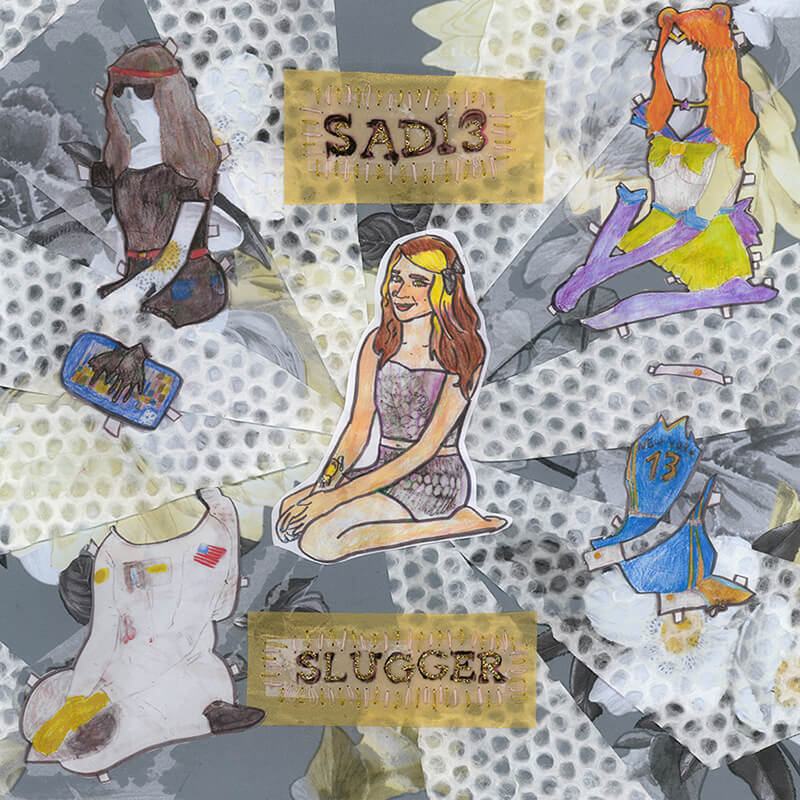Singer/writer/educator/musician/new-fangled renaissance creature, Sadie Dupuis of Speedy Ortiz took some time out to speak on her solo project Sad13 and the forthcoming album Slugger.
“I’ve been playing with the band Speedy Ortiz for the past five years and that started basically as my demos. I was home recording demos and putting them online as Speedy Ortiz and at some point my friends wanted to play the songs with me so we started a band,” Dupuis recalls.
Dupuis continues: “Eventually that turned into a full scale band, where my bandmates were playing on the recordings and arranging the songs with me, which is great and I love playing with them. But there’s something about home recording, getting to play all the instruments yourself, and working on the song at 5 a.m. in your bedroom, you just wind up with totally different results than you would when you’re working it out with four people. And I didn’t really have an outlet for that anymore.”
She adds, “So, I moved to Philly. I was subletting a bedroom from a friend and had just a tiny bed and a tiny desk. Nowhere near as expensive as the famous Tiny Desk. So, I just made this record in that bedroom and over two weeks, mostly with a little synth and MIDI controller, just plugging my guitar directly in,” she explains.
Dupuis adds, “I sort of intended for those to be demos, but I wound up redoing the vocals at Silent Barn, which is an all-ages art space, performance space, and art collective based in New York. We redid some of the drums there and had a friend mix it and here it is. It’s a brand new record!”

Dupuis goes on to discuss her drive to make intently affirmative pop music, “I love pop music…though I’ve mostly played in rock bands. As someone who likes that form, it’s been heartening to hear it politicized more than ever in the past few years, and certainly playing in a rock band I have always had sort of a political focus in writing. I had this idea that I was undoing the wrongs of the songs I grew up loving.”
She goes on to say, “Some of the songs were response tracks to music that I really loved as a tween, but now as an adult can look back and feel that I was being fed terrible messages. In a way it was undoing those kinds of messages for myself. I still feel that a lot of pop music whether it’s handling sexuality or romantic relationships kind, doesn’t take consent into consideration very often. A lot of the songs that are really huge hits are about pushing boundaries with your partner, rather than working together with your partner to have a nice time. So, that was a focus of [these] songs,” Dupuis explains.
She comments on her songwriting, “Lyrically, I always try to write from a gender neutral place, I avoid pronouns the majority of the time. I think that the hetero normativity of a lot of pop music was something that I wanted to not play into. Some of the songs are about pulling yourself out of a relationship that might be emotionally abusive and some of the songs are just about really being in conversation with your partner. Those things aren’t always the focus of pop songs, but I would like more of them to be that way.”

Continuing with this theme, she says, “So, Speedy Ortiz had done a tour right before I recorded this album that was a fund raiser. We donated all of the proceeds from the tour to the Girls Rock Camp Foundation, the organization that provides funding for all the Girls Rock programs around the country and internationally, which basically teach kids who might not otherwise has access to learning about recording music or playing in bands, specifically girls and non-binary kids,” Dupuis explains in an increasingly passionate tenor.
She continues, “I was inspired by having done that. We even had some of the camper bands open up for us on the tour. I definitely had an audience in mind that was like a 13-year-old girls who are starting bands for the first time. I think we’ve reached a point where we see a lot more people represented in genres of music that in the past were very strictly limited to like four cis white guys. Working with the Girls Rock [organization], I see how important it is for these kids to feel represented.”
Dupuis also discusses how music and art are important catalyst for effecting positive change: “My band is a tiny-tiny band in the microcosm of bands on the Internet but I’ll get letters from people saying, ‘Thank you for bringing up this topic, I wasn’t aware of it.’”
Dupuis digs in further, “So many of the rock bands I grew up thinking were the coolest, if I revisit the lyrics now I’m like ‘These are not very friendly to women’…An overwhelming majority of that music was talking about how a woman was horrible. I didn’t get it then; I didn’t realize that it wasn’t for me.”

She concludes, “As I’ve become older, I just won’t give a band the time of day if I feel their music is that way and I think that’s a big reason why I like to write from a gender neutral place. Because I don’t want anyone to feel excluded from a narrative that’s about love and heart break and feeling lonely, those should be universal things.”
For more, follow Sadie on Twitter @sad13
photos by Shervin Lainez

